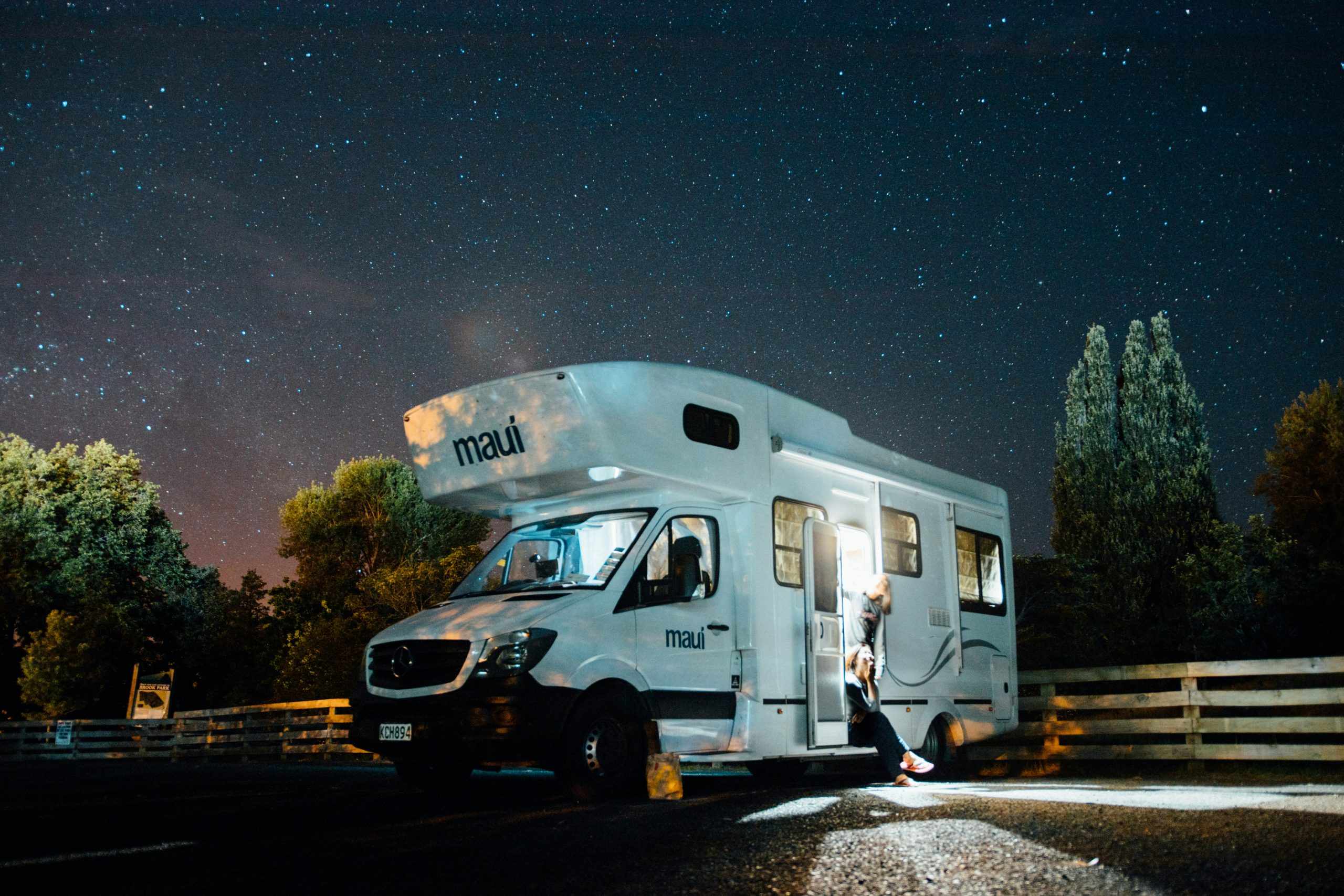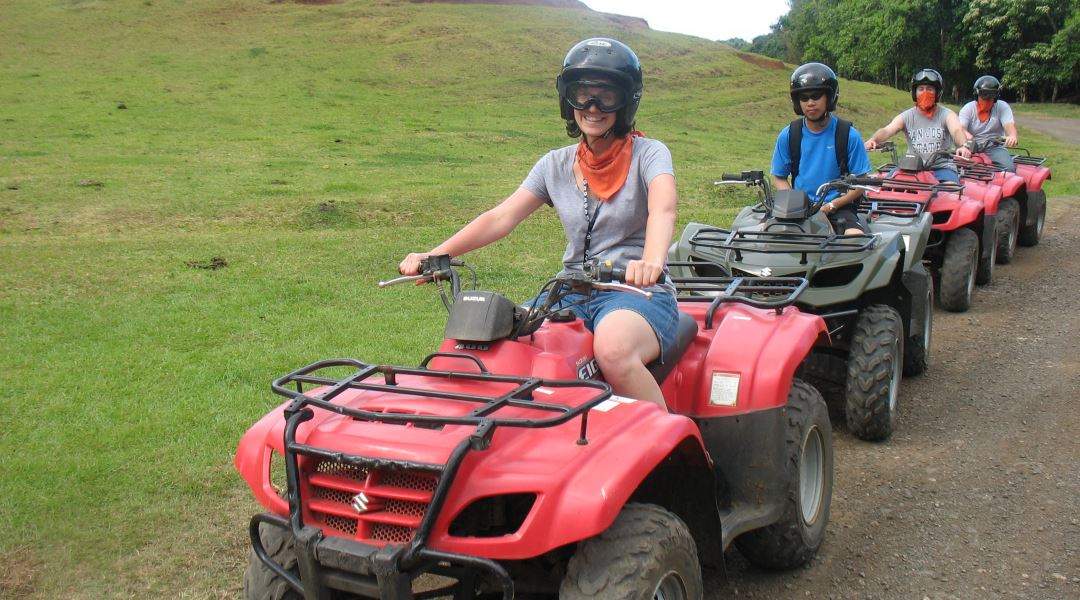There are just as many ways to enjoy the outdoors as there are outdoor enthusiasts. ATV, UAT, and ROV riding is a thrilling way to answer the call of nature. These vehicles are not only fun to ride, but they can also take you deep into the backcountry on some fantastic adventures all throughout the U.S.
Outdoorsy not only rents toy haulers perfect for transporting your adventure vehicle of choice—they also rent ATVs and UATs. All that said, let’s take a look at some of the premier ATV recreation destinations in the US that are worth the road trip.
Rent a Toy Hauler RV and Take Your ATV With You
1. Capitol State Forest, Washington
Let’s start our national survey in the great rainforests of the Pacific Northwest. The Capitol State Forest is located in the state of Washington, near the capital city of Olympia. The forest encompasses more than 100,000 acres of wild terrain and the climate is generally cool and mild during its open season—from April through December.
Video source: Washington State Department of Natural Resources
The forest boasts more than 80 miles of off-road, motorized vehicle trails and many more for hiking, biking, and equestrian exploration. The lush, mossy forests and mountain streams make for a breathtaking adventure and most trails are well-maintained and hard-packed. Keep an eye out for rainy weather though as it can result in seriously muddy tracks.
Your best bet is to head to the Middle Waddle or Creek campgrounds which offer parking and access to the motorized trails. These are not full-service campgrounds though, so plan on boondocking.
2. Imperial Sand Dunes, California
Time to have some fun in the sun in the great state of California. Also known as Glamis Sand Dunes, Imperial Sand Dunes is a recreation area managed by the BLM. It consists of a vast sea of sand dunes, some 40 miles long and 5 miles wide. Think of the area as one enormous sandbox in which you can ride pretty much any way you like.
Zoom up and down the dunes and go deep into the field for a tranquil desert experience—or you can even participate in the many races and events held here each year. Glamis is an ATV playground of awesomeness.
Thanks to the California weather, you can visit these sand dunes year-round. Weekly permits run as little as $35 per vehicle if you buy them in advance, with seasonal permits running around $150.
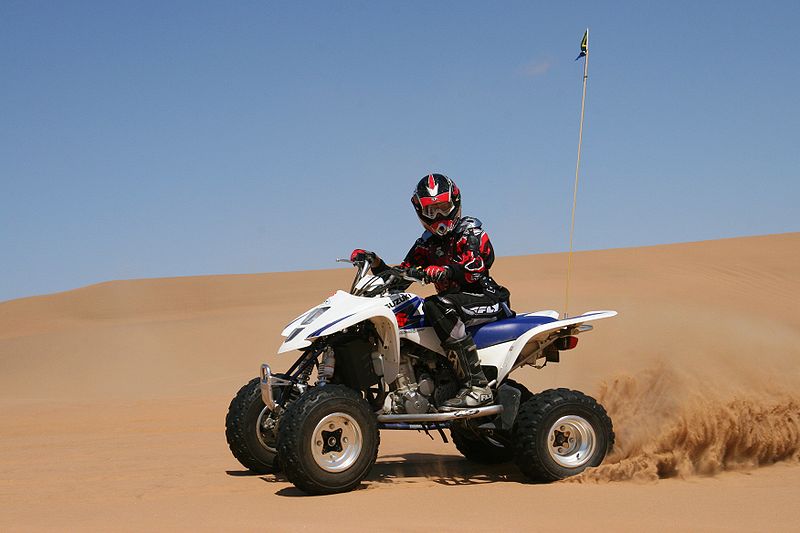
3. Paiute ATV Trail System, Utah
Paiute is located in the great state of Utah and is widely considered the largest and best ATV trail system in America. The main loop trail here is 200 miles long, and there are, all told, more than 2,000 miles of ATV trails. You can ride nearly any kind of trail you can imagine, from a quiet ride through a gentle forest on a smooth, well-groomed trail, to a moonscape scramble up the side of a steep ravine overlooking miles of painted desert.
Many of the towns here play host to ATV jamborees throughout the year and cater to adventurers and their vehicles. You can easily ride from town to town on a grand tour.
A National Parks pass is a must for adventuring in Utah, but depending on where you ride, you may need to pay state park fees. Also, many of the towns here have ATV rental businesses and guided ATV tours you can take if you are a first-time rider looking to get a taste of the off-road lifestyle.
4. Hidden Falls Adventure Park, Texas
Hidden Falls is an Austin, Texas-based, private outdoor playground for all kinds of off-road vehicles, from motorbikes to full-sized 4-by-4s.
One cool feature of private parks is that their trail networks are often specifically designed for different kinds of challenges and experience levels. It’s similar to a ski resort, with bunny slopes for the kids and black diamond trails for the hardcore hobbyists.
All the trails are carefully marked so you won’t run into any surprises along the way. With public lands, you need to do your homework before hitting the trails. Here, you can just show up, grab a map, and have at it.
Rates for the park are very reasonable, starting at $25 for a driver and vehicle and $15 for passengers and/or bystanders. They offer full RV campsites as well as cabins and other accommodations too. And although you can’t rent ATVs at the park, they can put you in touch with nearby businesses that will set you up for a day of fun on the trails.

5. Black Hills National Forest, South Dakota
The Black Hills of South Dakota is the quintessential American camping experience. The national forest is fantastic for camping, hiking, wildlife watching, fishing, and of course, off-road riding. In their 1.2 million acres of rugged landscape, you’ll find more than 600 miles of off-road accessible trails.
There is simply no shortage of incredible things to do here. Bring a tent and a fly rod, and consider taking an overnight ATV trip to a remote stream or lake. Brink a skillet, catch some trout, and enjoy one of the best meals any camper could ever hope for here. Just be sure to get a fishing license first.
There are a huge number of great campgrounds in the national forest, from rustic spots to full RV resorts. A parks pass will get you into the park and a camping fee will get you set up at one of the many trailheads. Keep your eyes open for wildlife and get ready to have the time of your life!
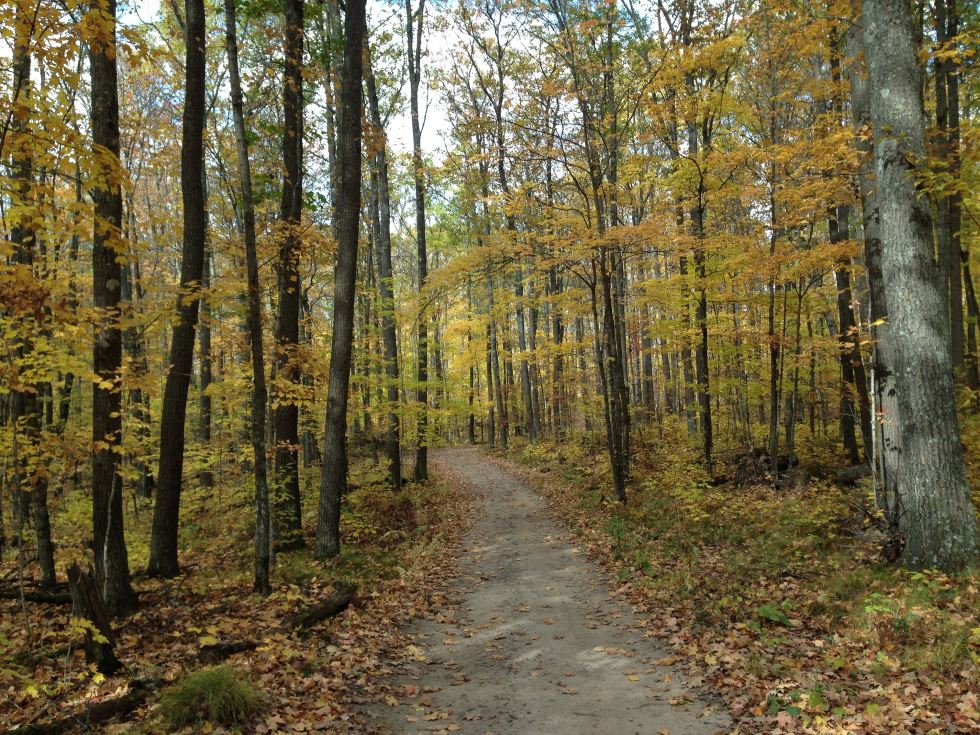
6. Hatfield-McCoy Trails, West Virginia
In Southern West Virginia, you’ll find one of the meccas of American ATV culture. The Hatfield-McCoy Trails are a series of privately owned trail systems that collectively span more than 700 miles of backcountry adventure in the Appalachians. Here, you’ll find just about every kind of trail, road, or track imaginable—from rocky ridge riding to mud bogging. The system is divided up into sections anchored by hotels and other accommodations catering to ATV riders and their kin.
For the ultimate experience, visit in early October and you’ll discover the National TrailFest. They have a parade, fireworks, ATV drag racing, poker nights, vendors galore, and pretty much anything else you can think of— all found in the woods of West Virginia. But if you go, book camping early.
7. Ocala National Forest, Florida
Just north of the Everglades in the Florida panhandle is Ocala National Forest. With more than 200 miles of ATV trails and 80 miles for full-sized off-road vehicles, this is another fantastic place to explore seriously.
Being that this is Florida, you won’t find much in the way of elevation changes here (the riding is mostly on flat land). What you will find are innumerable lakes, streams, and springs nearly everywhere you go, and exotic plants and animals around every corner. Bring a pair of swim trunks and take a dip in one of the springs to cool off after a long ride.
There are a number of campgrounds in Ocala, but unlike many national forests, your parks pass won’t always work here. The private concessions that run many of the campgrounds charge for their use, even if you have a national pass.
8. Baxter State Park, Maine
We started in the Pacific Northwest and are wrapping up in the Atlantic Northeast. There are more than 1,200 miles of ATV trail systems crisscrossing the wilderness in this region, though not all are part of the same trail system. These are remote locations, so do your research and plan ahead.
Typically, most of the trails are closed in the winter, though if you want to go snowmobiling in the lower 48, this is probably the best region for it.
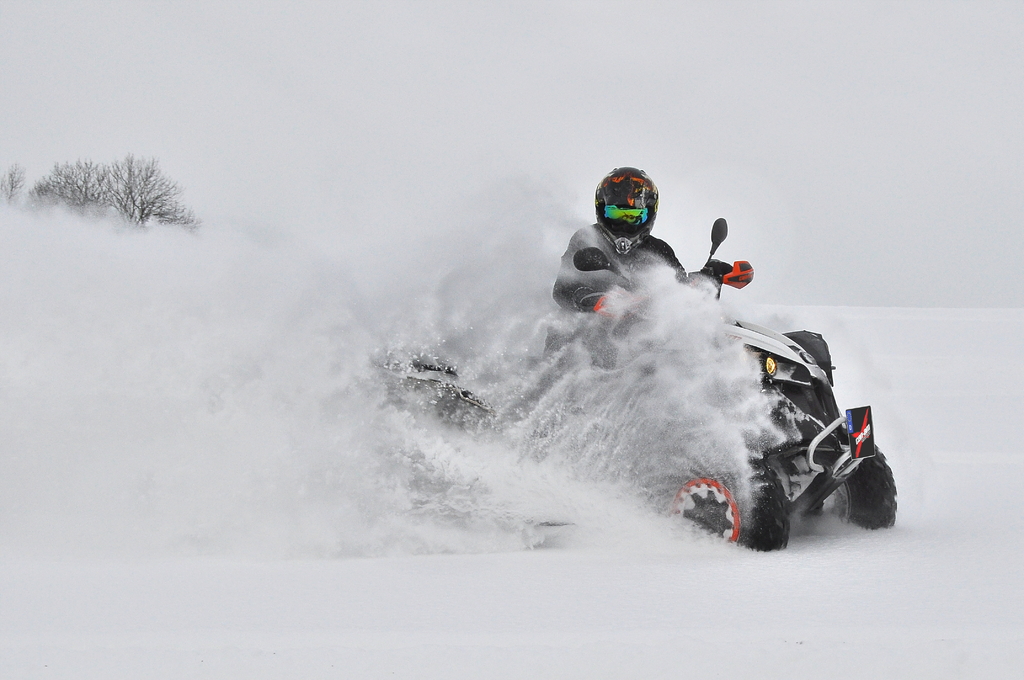
One of the year-round operations is Katahdin Lodge near Baxter State Park. From their grounds, you can hit up a huge number of the local trails in the area. The scenery is absolutely amazing nearly every time of year and yet strikingly different, depending on the season. Just bring a coat because, outside of high summertime, it gets mighty chilly in central Maine.
ATV Rules, Regulations, and Safety
When exploring ATV trails, it’s essential to follow local rules and regulations to ensure a safe and enjoyable experience for both riders and the environment. Here are key points to keep in mind when riding ATVs:
Local and State Regulations
Each state and trail system has its own set of regulations governing ATV use. Common rules include:
- Age Restrictions: Many trails require riders to be a certain age, often 16 or older, to operate an ATV. Some areas may allow younger riders, but they often need to complete a safety course or ride with an adult.
- Permits and Passes: Many trails require riders to purchase permits or passes. These are usually available online or at trailheads. Make sure to check if a permit is needed in advance.
- Operating Hours: Some trails have specific hours during which ATVs are allowed to ride. Be sure to check trail hours before heading out.
Safety Gear Requirements
Safety is a top priority when riding an ATV. Always wear the appropriate safety gear, which typically includes:
- Helmet: A DOT-approved helmet is required in most areas to protect your head in case of an accident.
- Goggles: Protect your eyes from dust, debris, and UV rays with proper goggles.
- Gloves: Durable gloves provide grip and protection.
- Padded Clothing: Consider wearing padded gear, such as elbow and knee pads, as well as protective jackets or body armor to reduce injury risk.
Trail Etiquette
Respecting other riders and the environment is essential for a positive ATV experience. Practice good trail etiquette by:
- Yielding to other users: If the trail is shared with other outdoor enthusiasts like hikers, bikers, or horseback riders, always yield the right of way.
- Staying on marked trails: Straying from marked trails can harm the environment, disturb wildlife, and lead to legal consequences.
- Respecting noise limits: Some areas have noise regulations to minimize disturbance to wildlife and other visitors. Always operate your ATV at a responsible noise level.
Environmental Considerations
Riding ATVs can have a significant environmental impact if not done responsibly. Here’s how to minimize your footprint:
- Leave No Trace: Stick to established trails and avoid damaging vegetation and soil. Never ride off-trail unless permitted to do so.
- Wildlife Protection: Be mindful of wildlife and avoid disturbing animals in their natural habitats. Keep noise levels low and respect protected areas.
- Trash and Litter: Always pack out everything you bring with you, including trash and waste. Help maintain the beauty of natural spaces.
ATV Operation and Handling
Understanding how to properly operate and control your ATV is critical for safety:
- Know Your ATV: Before hitting the trails, ensure you’re familiar with your vehicle’s functions, including braking, acceleration, and handling.
- Speed Limits: Stick to posted speed limits or lower speeds in difficult terrain. Remember that speed can reduce reaction time and increase accident risk.
- Avoid Riding Under the Influence: Riding an ATV while under the influence of alcohol or drugs is illegal and highly dangerous. Always ride sober to ensure your safety and that of others.
By adhering to local regulations, wearing the appropriate safety gear, and respecting the environment, you can help preserve ATV trails for future generations while enjoying a safe and thrilling adventure.
RV ATV Trips FAQ
Get answers to the most common questions about taking your ATV with you in your RV.
How do I transport an ATV with an RV?
There are several ways to transport an ATV with an RV:
- Cargo rack or hitch-mounted carrier: If the ATV is lightweight, you can use a cargo rack or hitch-mounted carrier on the RV to transport it.
- Trailer: A small trailer can be used to tow the ATV behind the RV. This is one of the most common and secure methods.
- Toy hauler RV: Some RVs, called toy haulers, are designed with built-in garages for transporting ATVs, motorcycles, and other recreational vehicles.
Are there RV-friendly campgrounds with ATV trails?
Yes, many campgrounds and RV parks are located near ATV trails or offer direct access to them. Look for ATV-friendly campgrounds or off-road RV parks that allow for ATV riding directly from the campground. Some popular off-road destinations also offer designated areas for both RV parking and ATV access.
What should I check before going on an ATV RV trip?
Before setting off on an ATV RV trip, make sure to:
- Inspect your RV’s towing capacity to ensure it can safely carry your ATV and any other gear.
- Check the ATV’s condition, including tires, battery, oil, and fuel levels.
- Confirm trail access: Research the area to ensure there are ATV-friendly trails and that the trails are open to the public.
- Secure your ATV: Make sure your ATV is properly secured on the carrier or trailer with appropriate tie-downs or straps.
- Prepare for weather conditions: Check the forecast and be ready for potential weather changes.
What gear do I need for an ATV RV trip?
Essential gear for an ATV RV trip includes:
- Helmet and protective gear: Ensure you and your passengers wear helmets, gloves, and suitable protective clothing.
- Tow straps and tie-downs: For securing your ATV on the RV or trailer.
- Tools and spare parts: Pack a toolkit for basic maintenance and repair.
- Water and supplies: Bring enough water, food, and camping equipment for the trip.
- First aid kit: Be prepared for any accidents with a well-stocked first aid kit.
Rev up your engine and jump onto Outdoorsy today to find yourself a sweet toy hauler for your next off-road adventure!

